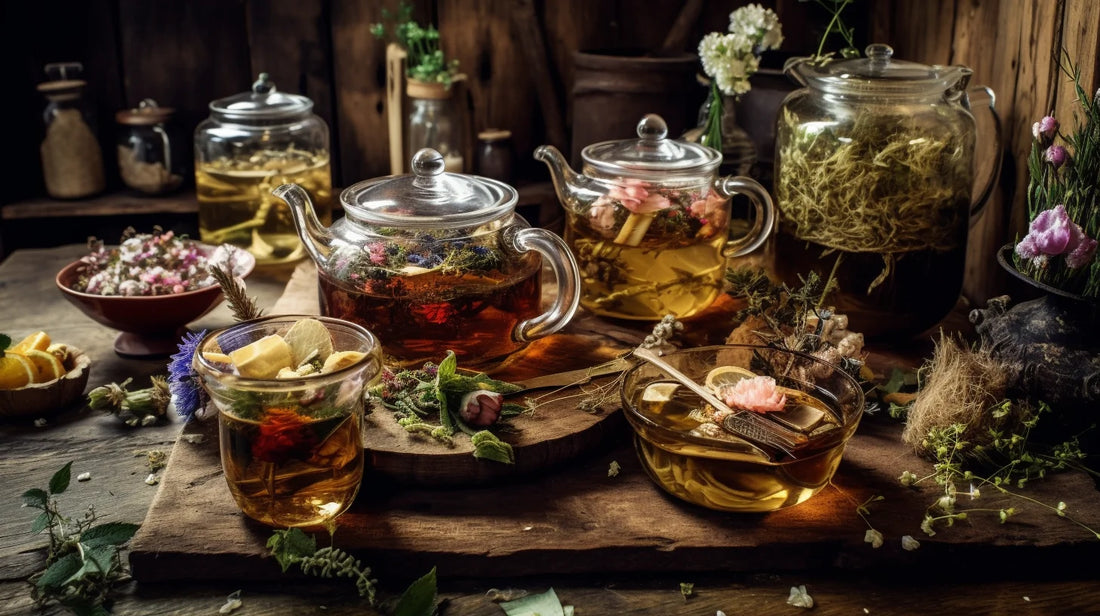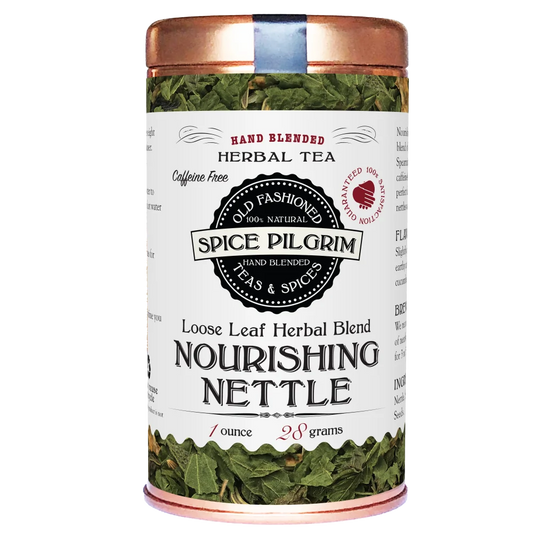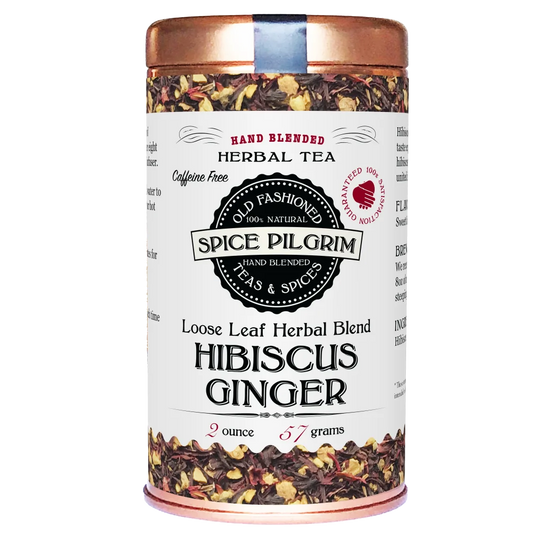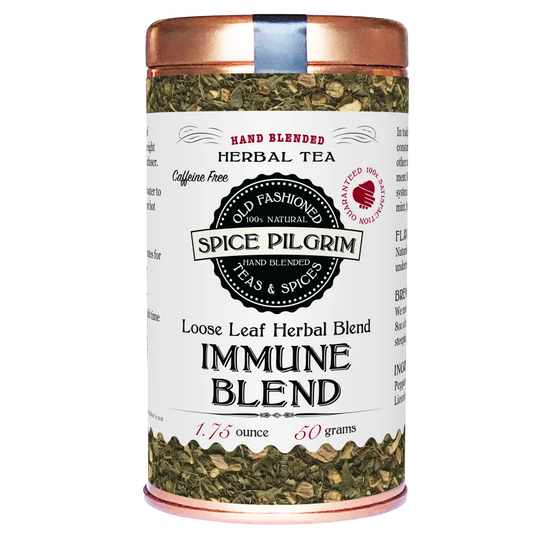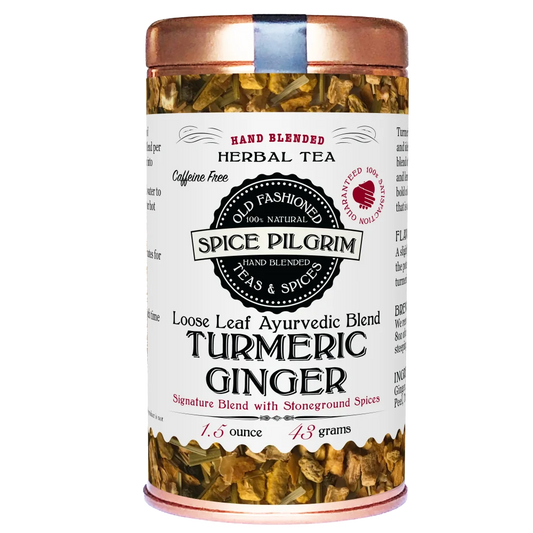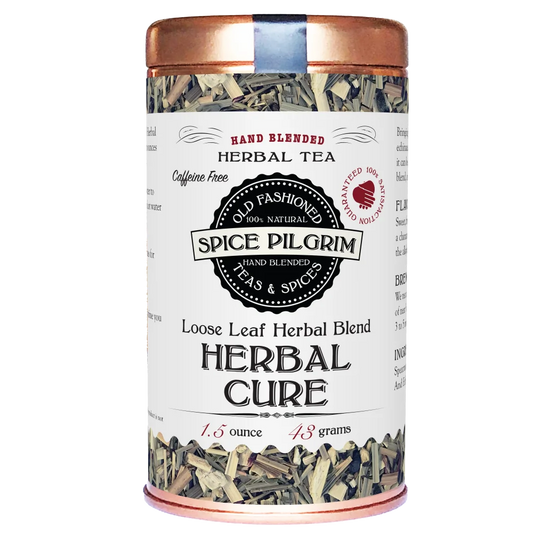A Cup of Relief: The Power of Tea
Imagine this: you're in the middle of a beautiful spring day, but instead of enjoying the blooming flowers and the gentle breeze, you're sneezing, coughing, and rubbing your itchy eyes. Allergies can turn a lovely day into a nightmare. But what if we told you there's a natural, delicious, and soothing remedy right in your kitchen cabinet? Yes, we're talking about tea.
The Allergy-Tea Connection: What's the Deal?
Tea, especially certain herbal blends, can be a powerful ally in your battle against allergies. The secret lies in their natural anti-inflammatory and antihistamine properties. These properties can help reduce allergy symptoms like sneezing, itching, and congestion. But not all teas are created equal when it comes to fighting allergies.

The Spice Pilgrim's Allergy-Fighting Arsenal
At Spice Pilgrim, we offer a variety of caffeine-free herbal blends that can help soothe your allergy symptoms. Here are a few of our favorites:
1. Nourishing Nettle Tea
This tea is a blend of nettle, spearmint, lemon peel, and fennel seeds. Nettle is known for its natural antihistamine properties, which can help reduce the body's production of allergy-causing histamines. Spearmint adds a refreshing flavor and has anti-inflammatory properties. Lemon peel is rich in Vitamin C, which can enhance your immune system, and fennel seeds can help soothe irritated nasal passages.
From our Shop
Nourishing Nettle
2. Hibiscus Ginger
This vibrant blend combines the tangy flavor of hibiscus with the spicy kick of ginger. Hibiscus is rich in Vitamin C, which can enhance your immune system and help your body fight off allergens. Ginger, on the other hand, is a powerful anti-inflammatory that can soothe irritated nasal passages and reduce congestion.
From our Shop
Hibiscus Ginger
Sale price
From $14.00 USD
3. Immune Blend
This robust blend includes peppermint, licorice, and dried ginger. Peppermint is known for its soothing properties and can help clear up congestion. Licorice has anti-inflammatory properties and can soothe irritated nasal passages. Dried ginger is a powerful anti-inflammatory that can reduce congestion and boost your immune system.
From our Shop
Immune Blend
Sale price
From $14.00 USD
4. Turmeric Ginger
This warming blend combines the anti-inflammatory powers of turmeric and ginger with the refreshing flavors of lemongrass, orange peel, and lemon peel. Black peppercorns are added to enhance the absorption of turmeric. Together, these ingredients can help reduce inflammation in the nasal passages, making it easier for you to breathe, and boost your immune system.
From our Shop
Turmeric Ginger
Sale price
From $14.00 USD
5. Herbal Cure
This blend is a powerhouse of herbs known for their medicinal properties. It includes spearmint, echinacea, lemongrass, hibiscus, and elderberry. Spearmint and lemongrass can soothe irritated nasal passages, while echinacea and elderberry can boost your immune system. Hibiscus adds a tangy flavor and is rich in Vitamin C, which can help your body fight off allergens.
From our Shop
Herbal Cure
Sale price
From $14.00 USD
A Tale of Allergy Relief: Meet Sarah
Let's take a moment to share a story about one of our customers, Sarah. Sarah had been struggling with spring allergies for years. She tried everything from over-the-counter medications to expensive prescription drugs, but nothing seemed to provide lasting relief.
One day, she stumbled upon our Spice Pilgrim website and decided to give our teas a try. She started with our Nourishing Nettle Tea, intrigued by its natural antihistamine properties. After a few weeks of regular consumption, she noticed a significant reduction in her allergy symptoms. Encouraged by these results, she decided to try our other allergy-fighting teas as well. Today, Sarah enjoys her spring days outdoors without the constant worry of an allergy attack.
FAQ: Your Questions Answered
Q: How often should I drink these teas for allergy relief? A: While everyone's body responds differently, we generally recommend drinking 2-3 cups of our allergy-fighting teas per day during allergy season for the best results.
Q: Can these teas replace my current allergy medication? A: While our teas can help reduce allergy symptoms, they should not replace any prescribed medication. Always consult with your healthcare provider before making changes to your allergy treatment plan.
Possible Side Effects
While our teas are natural and generally safe for consumption, it's important to be aware of potential side effects. Here are a few to keep in mind:
-
Spearmint leaves: Spearmint is generally safe to use, but overuse can lead to nausea, vomiting, or diarrhea. It can also cause allergic reactions in people who are sensitive to it.
-
Lemon Peel: Generally safe, but when used in large amounts, it could potentially cause some side effects due to the concentration of oils and other compounds. These could include stomach upset, cramps, and heartburn.
-
Fennel Seeds: Fennel seeds are usually safe when eaten in moderation. Some people may experience allergic reactions, and in larger amounts, they may cause nausea, vomiting, and sun sensitivity.
-
Hibiscus flowers: Hibiscus is generally considered safe but can sometimes cause upset stomach, gas, constipation, nausea, painful urination, headache, and ringing in the ears. Additionally, hibiscus might lower blood pressure; it can enhance the effect of blood pressure medication.
-
Peppermint leaves: Peppermint is generally safe, but it can cause some side effects including heartburn, dry mouth, nausea, and abdominal pains.
-
Ginger root: Ginger is generally safe, but in some people, it can cause side effects such as mild heartburn, diarrhea, and general stomach discomfort. Some women have reported extra menstrual bleeding while taking ginger.
-
Licorice root: Consuming licorice root in large amounts can lead to high blood pressure, low potassium levels, weakness, paralysis, and occasionally brain damage. It can also interact negatively with several types of medications.
-
Turmeric: Turmeric is generally safe but can cause stomach upset, dizziness, or diarrhea. In high doses or over a long period of time, it may cause gastric ulcers.
-
Lemongrass: When used in food amounts, lemongrass is generally safe. However, when used medicinally, it can cause side effects such as dry mouth, increased urination, and a rash.
-
Orange Peel: Generally safe, but when used in large amounts, it could potentially cause some side effects due to the concentration of oils and other compounds. These could include stomach upset, cramps, and heartburn, similar to lemon peel.
-
Black Peppercorns: Generally safe, but in some people, it can cause stomach upset, ulcers, or kidney damage.
Remember, everyone's body responds differently to different substances, and these herbs might interact with medications or other herbs. Always consult with a healthcare provider before starting any new herbal regimen.
Engage with Us: What's Your Tea Story?
We've shared our knowledge and a story from one of our customers, but now we want to hear from you. Have you tried using tea for allergy relief? What was your experience? Share your stories in the comments below.
